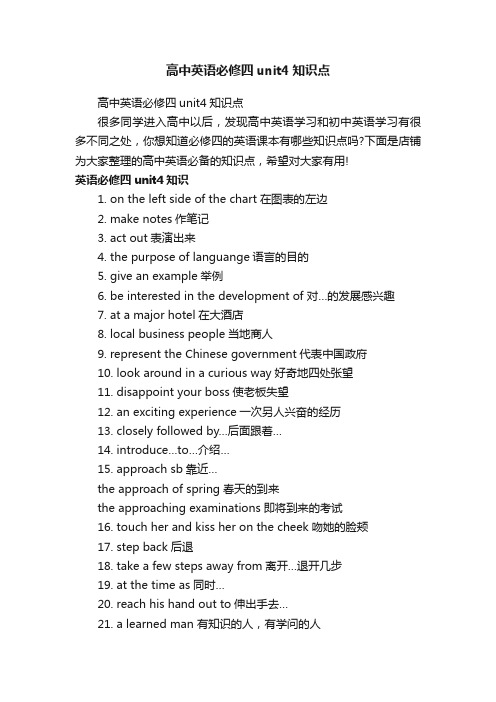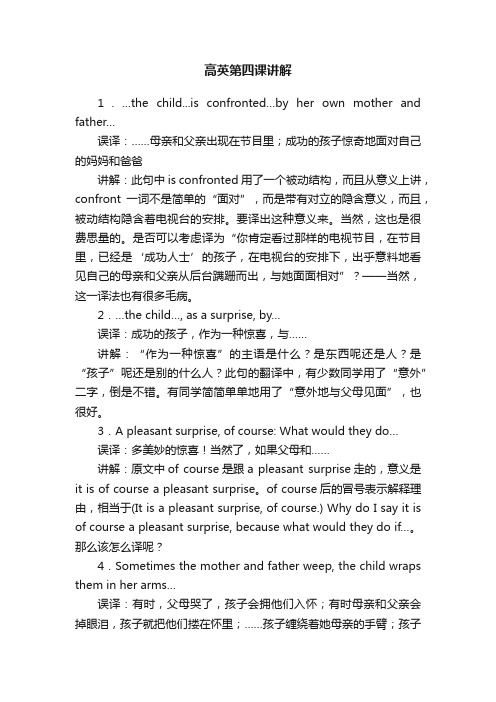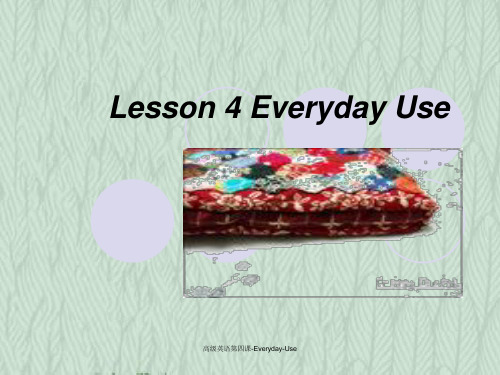高英第四课总结
(完整版)高级英语第4课InauguralAddress课件翻译译文

3 We dare not forget today that we are the heirs of that first revolution. Let the
disciplined by a hard and bitter peace, proud of our ancient heritage, and
27 Finally, whether you are citizens of America or citizens of the world, ask of
the same high standards of strength and sacrifice which we ask of you.
anywhere in the Americas. And let every other power know that this
10 To that world assembly of sovereignstates, the United Nations, our last best
invective, to strengthen its shield of the new and the weak, and to enlarge the
responsibility; I welcome it. I do not believe that any of us would exchange
with any other people or any other generation. The energy, the faith, the
a good conscienceour only sure reward, with history the final judge of our
高级英语第二册第四课相关逻辑知识

了解基本逻辑,避免常见错误要了解基本逻辑错误一定不能错过一篇英文小品文Love Is A Fallacy (作者Max Shulman),这里仅列举出十种最常见的逻辑错误。
1.草率前提(Dicto Simpliciter)例如:Women are on average not as strong as men and less able to perform well politically. Therefore, women can't pull their weight in government work.点评:虽然女性确实在政界担任较少工作,但这不意味着女性群体中所有的人都是这样。
2.过度概化(Hasty Generalization)例如:McDonald's and KFC offer foods with little nutrition, and thus we cannot expect any fast food restaurant to provide us with nutritious foods.点评:两个个例不足以推出一个真理。
3.因果颠倒(Post Hoc)例如:Most young criminals watch violent movies before they commit their crimes; obviously, violent movies lead to juvenile delinquency.点评:甲事情发生在乙事情之前,这并不代表着先发生的甲事情就是后发生的乙事情的原因。
4.矛盾前提(Contradictory Premises)例如:If God can do everything, can he make a stone so heavy that he can't carry?点评:前提条件中就有相互矛盾的地方,结论当然是错误的。
高中英语必修四unit4知识点

高中英语必修四unit4知识点高中英语必修四unit4知识点很多同学进入高中以后,发现高中英语学习和初中英语学习有很多不同之处,你想知道必修四的英语课本有哪些知识点吗?下面是店铺为大家整理的高中英语必备的知识点,希望对大家有用!英语必修四unit4知识1. on the left side of the chart在图表的左边2. make notes作笔记3. act out表演出来4. the purpose of languange语言的目的5. give an example举例6. be interested in the development of 对…的发展感兴趣7. at a major hotel在大酒店8. local business people当地商人9. represent the Chinese government代表中国政府10. look around in a curious way好奇地四处张望11. disappoint your boss使老板失望12. an exciting experience一次另人兴奋的经历13. closely followed by…后面跟着…14. introduce…to…介绍…15. approach sb靠近…the approach of spring春天的到来the approaching examinations即将到来的考试16. touch her and kiss her on the cheek吻她的脸颊17. step back后退18. take a few steps away from离开…退开几步19. at the time as同时…20. reach his hand out to伸出手去…21. a learned man 有知识的人,有学问的人22. in the same way同样…23. spoken language口语24. express their feelings表达感情25. keep physical distance,保持身体距离高中英语知识重点It 作形式宾语用来替代作宾语的从句、动词不定式、动名词,而把真正作宾语的从句、动词不定式、动名词置于句尾。
高英第四课讲解

高英第四课讲解1.…the child...is confronted…by her own mother and father…误译:……母亲和父亲出现在节目里;成功的孩子惊奇地面对自己的妈妈和爸爸讲解:此句中is confronted用了一个被动结构,而且从意义上讲,confront一词不是简单的“面对”,而是带有对立的隐含意义,而且,被动结构隐含着电视台的安排。
要译出这种意义来。
当然,这也是很费思量的。
是否可以考虑译为“你肯定看过那样的电视节目,在节目里,已经是‘成功人士’的孩子,在电视台的安排下,出乎意料地看见自己的母亲和父亲从后台蹒跚而出,与她面面相对”?——当然,这一译法也有很多毛病。
2.…the child…, as a surprise, by…误译:成功的孩子,作为一种惊喜,与……讲解:“作为一种惊喜”的主语是什么?是东西呢还是人?是“孩子”呢还是别的什么人?此句的翻译中,有少数同学用了“意外”二字,倒是不错。
有同学简简单单地用了“意外地与父母见面”,也很好。
3.A pleasant surprise, of course: What would they do…误译:多美妙的惊喜!当然了,如果父母和……讲解:原文中of course是跟a pleasant surprise走的,意义是it is of course a pleasant surprise。
of course后的冒号表示解释理由,相当于(It is a pleasant surprise, of course.) Why do I say it is of course a pleasant surprise, because what would they do if…。
那么该怎么译呢?4.Sometimes the mother and father weep, the child wraps them in her arms…误译:有时,父母哭了,孩子会拥他们入怀;有时母亲和父亲会掉眼泪,孩子就把他们搂在怀里;……孩子缠绕着她母亲的手臂;孩子靠在桌子旁把他们搂在怀里讲解:此句在结构上是两个没有使用连词连接的并列分句,实际上是对narrator想象中的情景的一个描述,这种描述往往是按时间连贯在一起的,因此只是两个并列的动作,动作一与动作二之间虽然有比较明确的逻辑关系(如时间、因果等),但并没有指明,因此所强调的只是两个纯粹的动作,也因此,翻译时使用“了”、“会”、“就”等词语就不合适了。
高级英语Unit 4 Everyday use 知识点梳理

Unit 4 Everyday use for your grandmammaWhat is a plot?If an author writes, "The king died and then the queen died," there is no plot for a story. But by writing, "The king died and then the queen died of grief," the writer has provided a plot line for a story.A plot is a causal sequence of events, the "why" for the things that happen in the story. The plot draws the reader into the character's lives and helps the reader understand the choices that the characters make.The Structure of a plot1.Exposition - introduction of themain characters and setting2.Rising Action - one (or more)characters in crisis3.Climax - point of highest emotion;turning point4.Falling Action - resolution ofcharacter’s crisis5.Denouement (outcome) - “untyingof plot treads”; resolutionNarration NarratorFirst-person narration; third-person narrationNarrator ≠ authorThe titleThe meaning of the title requires the reader to read deeper within the short story. The phrase ―Everyday Use‖ brings about the question whether or not heritage should be preserved and displayed or integrated into everyday life.―Everyday Use‖ pertains not only to the quilt, but more so to people's culture and heritage and how they choose to honor it.The themeThe main theme in the story concerns the characters‘ connections to their ancestral roots.Dee Johnson believes that she is affirming her African heritage by changing her name, her mannerisms, and her appearance, even though her family has lived in the United States for several generations.The themeMaggie and Mrs. Johnson are confused and intimi dated by her new image as ―Wangero‖. Their own connections to their heritage rest on their memories of their mothers and grandmothers; they prefer to remember them for who they were as individuals, not as members of a particular race.Because of their differing viewpoints, they place different values on some old quilts and other objects in the home.The backgroundBy the 1960s, following the success of civil rights leaders like Martin Luther King, Jr. and Malcolm X, some African Americans began to take pride in their heritage as a way of gaining their esteem, forging a group identity, and creating a platform for greater political power.Known as ―black pride‖ or Black Nationalism, these ideas encouraged many young African Americans to l earn about their cultural ancestry, grow their hair into ―Afros‖, dress in traditional African clothing, and reject their ―slave names‖. Cultural nationalismCultural nationalism was founded on the belief that blacks and whites have separate values, histories, intellectual traditions and lifestyles and therefore that in reality, there are two separate Americas.Cultural nationalism was often expressed a as a conceptual and aesthetic return to the motherland (rarely an actual return), a recognition of the African roots that blacks in America had begun to forget as a result of slavery, biased education and stereotyped representations in the mass media.In his article, "Black Cultural Nationalism," Ron Karenga, one of the strongest voices in favor of cultural nationalism,writes,"Let our art remind us of our distaste for the enemy, our love for each other, and our commitment to the revolutionary struggle that will be fought with the rhythmic reality of a permanent revolution"Cultural nationalism on a visual level was expressed in the same way, by the wearing of brightly colored African clothing, such as dashikis, and the adaptation of the Afro hair style, both symbolic representations of the important relationship between Blacks in America and their African roots.Mama (Ms Johnson)The narrator of the story.She is a middle-aged or older African-American woman living with her younger daughter, Maggie.Although poor, she is strong and independent, and takes great pride in her way of life.She is over weight, and built more like a man than a woman. She has strong hands that are worn from a lifetime of work.MaggieDee‘s sister who wa s badly burned by a fire when she was young.She has low self-confidence and becomes uncomfortable when Dee is around.Maggie contrasts Dee by showing a special regard for her immediate family.DeeMrs. Johnson‘s older daughter.She is attractive, sophisticated, and well-educated.She is also very selfish, bold, and overly confident.When she returns home, she insists her family calls her Wangero because she wants to be a bigger part of her culture. The only reason she wants this is because it‘s sudde nly the new trend.the historical presentThe historical present (sometimes dramatic present) refers to the employment of the present tense when narrating past events. it is used in fiction, for ―hot news‖ (as in headlines), and in everyday conversation. In conversation, it is particularly common with ―verbs of communication‖ such as tell, write, and say (and in colloquial uses, go).The historical present has the effect of making past events more vivid.P1: the yard that Maggie and I made so clean and wavywavy: having regular curvesA wavy line has a series of regular curves along it.Here in the text the word describes the marks in wavy patterns on the clay ground left by the broom.P1: It is like an extended living room.Extended: enlargedP1: When the hard clay is swept cleanA fine-grained, firm earthy material that is plastic when wet and hardens when heated, consisting primarily of hydrated silicates of aluminum and widely used in making bricks, tiles, and pottery.粘土,泥土P1: the fine sand around the edges lined with tiny, irregular groovesFine: thin, in small particlesGroove nouna long narrow cut in the surface of sth hard:Cut a groove 3 cm from the top of the piece of wood.沟、槽P1: sit and look up into the elm tree榆树P2: homely and ashamed of the burn scarsNot handsome or beautiful: plain, unattractive. (Never say a woman or a girl is ugly. Say she is plain or homely.)Of a plain and unsophisticated nature: artless, unadorned, unpolished. (homely furniture)Of or relating to the family or household: domestic, household. (homely skills)P2: eying her sister with a mixture of envy and aweLook at and watch don‘t suggest the feelings of the person who looks.To eye means to look carefully, suspiciously, or thoughtfully, with fear, doubt, envy, desire, etc.P2: eying her sister with a mixture of envy and awenoun [U] feelings of respect and slight fear; feelings of being very impressed by sth/sb:awe and respectHe speaks of her with awe.be / stand in awe of sb/sth to admire sb/sth and be slightly frightened of them/it:While Diana was in awe of her grandfather, she adored her grandmotheramazement, wonderP2: She thinks her sister has held life always in the palm of one hand, that "no" is a word the world never learned to say to her.The world has satisfied her sister’s every desire.Her sister has a firm control of life.P3: the child who has "made it" is confrontedTo have made it: if you make it, you are successful in achieving sth. Difficult, or in surviving through a very difficult period.I believe I have the talent to make it.You are brave and courageous. You can make it.P3: the child who has "made it" is confronted1 (of problems or a difficult situation) to appear and need to be dealt with by sb: the economic problems confronting the country3 to face sb so that they cannot avoid seeing and hearing you, especially in an unfriendly or dangerous situation: This was the first time he had confronted an armed robber.P3: her own mother and father, tottering in weakly from backstage.1. [usually +adv. / prep.] to walk or move with weak unsteady steps, especially because you are drunk or ill/sick; stagger: She managed to totter back to her seat.2 to be weak and seem likely to fall: the tottering walls of the castleoutLoud enough so as to be heard. 大声讲!没人能把你怎么样。
高级英语第四课-Everyday-Use

(racism and sexism) in their lives.
The Relationship between Dee and I
The Contrast between Dee and Maggie
The Climax: Grandma’s Quilts
Theme: Everyday Use
The Heirloom – Quilts: Display VS
高级英语第四课-Everyday-Use
高级英语第四课-Everyday-Use
3
About Alice Walker
After her junior year at the college, she won a scholarship as an exchange student to Uganda, and Kenya. This most probably helped her to understand the African culture.
When she went to Sarah Lawrence College in New York on scholarships in the early 60’s, the civil rights movement was in full swing. She was actively involved in the movement. She graduated in 1965, having the BA.
Unit 4 小课文知识点(课件)高中英语人教版2019选择性必修第三册

There was nothing like......to cheer us up. 没有什么比得上....能让我们振奋起来。
没有什么比得上【一个帮助Barret挣钱的好主意】能让我们振 奋起来。
There was nothing like a marvelous/amazing idea to help Barret make money to cheer us up.
要是没有人来救我怎么办 ?我从来没有感到如此孤独和绝望。
What if no one came to my rescue? Never did I feel so lonely and hopeless/desperate.
总结 3.There was nothing like a good dinner and some music to cheer us
不难想象我的兴奋和激动当我得知伦敦美术馆要举办画展 。
总结
It was easy to imagine my excitement / thrill/θrɪl/ when I knew that a Chinese painting exhibition will be held in London.
总结 2. What if they were delayed? We felt so alone and desperate.
① What if.... 要是...怎么办呢 ? ② Never did sb feel so alone and desperate/hopeless.
某人从来没有感觉过如此的孤独和绝望。
8. He paid us back by his commitment to save us from a slow but painful death. 他回报了我们,实现了他的承诺,把我们从缓慢而痛苦的
高英第四课 Dee

She is determined to stare down any disasters in her efforts. She has a temper. When she can not get what she wants, she will be angry, even looks at her mother with hatred.
as ambitious and aggressive as a white person
deeply influenced by the white people’s culture though from a black family.
look down upon her hometown from the standing point of city civilization hates almost all that she was born with
4)Other aspects
• Maggie said “ Mama, when did Dee ever have any friends?”(line107) It reveals that Dee is bad-tempered and is not easy to get along with.
1)Appearance
• Dee is lighter than Maggie, with nicer hair and a fuller figure.(line 60) • Her feet are always neat-looking.(line122) • Para.12 She is fashionable, good at dressing herself up.
- 1、下载文档前请自行甄别文档内容的完整性,平台不提供额外的编辑、内容补充、找答案等附加服务。
- 2、"仅部分预览"的文档,不可在线预览部分如存在完整性等问题,可反馈申请退款(可完整预览的文档不适用该条件!)。
- 3、如文档侵犯您的权益,请联系客服反馈,我们会尽快为您处理(人工客服工作时间:9:00-18:30)。
第四课Paraphrase1.Pianos and models, Paris, Vienna and Berlin, masters and mistresses, are not needed by awriter. (Paragraph 1)If you want to be a musician or a painter, you must own a piano or hire models, and you have to visit or even live in cultural centers like Paris, Vienna and Berlin. And also you have to be taught by masters and mistresses. However, if you want to be a writer, you don’t need all this.2.No demand was made upon the family purse. (Paragraph 1)Paraphrase: there was no need for a writer to spend much of the family money in order to write.3.It was she who used to come between me and paper when I was writing reviews. (Paragraph3)Paraphrase: She used to cause arguments or problems between me and what I was writing.4.She was so constituted that she never had a mind or a wish of her own, but preferred tosympathize always with the minds and wishes of others. (Paragraph 3) (P56) Paraphrase: She was made up, formed or designed in such a way that she never had an opinion or a wish of her own, but preferred to think and act in harmony with other people’s minds and wishes.5. Above all----I need not say it ---she was pure. (Paragraph 3) P56Of all the qualities, purity was the most important one.6. In those days---the last of Queen Victoria---every house had its Angel. (Paragraph 3) P56 Paraphrase: On the first level, in the days of Queen Victoria, every house had a woman like that, who was sympathetic, charming and unselfish. On a deeper level, in the last period of the reign of Queen Victoria, the belief that every woman should be sympathetic, charming, unselfish, and above all, pure was prevalent in English society.7. Be sympathetic; be tender; flatter; deceive; use all the arts and wiles of our sex. (Paragraph 3) P56Paraphrase: Understand the mind of men and not to disagree with them; don’t be too harsh in your criticism; praise the book in an insincere way in order to please the reader, don’t write what you really thought or tell lies instead of telling the truth; use the sly, cunning tricks of our sex.Rhetorical devices1. It is true I am a woman, it is true I am employed; but what professional experiences have I had? It is difficult to say. (Paragraph 1)(Rhetorical question)2. What could be easier than to write articles and to buy Persian cats with the profits? But wait a moment. (Paragraph 3)(Rhetorical question)3 But to show you how little I deserve to be called a professional woman, how little I know of the struggles and difficulties of such lives , I have to admit that instead of spending that sum upon bread and butter, rent ,shoes and stockings, or butcher’s bills, I went out and bought a cat….. (Paragraph 2)其中:bread and butter: this set phrase means food and the most important and basic things. (synecdoche提喻)butcher’s bills: butcher’s bills stand for meat bought from a butcher. This is metonymy(转喻).4 .No demand was made upon the family. (Paragraph 1)Purse: (metonymy转喻) stand for money, financial conditions, e.g. the family purse家庭财政5. “Killing the Angel in the House” (Paragraph 3) is a metaphor. (暗喻)6. It was she who used to come between me and paper when I was writing reviews. (Paragraph 3) (metonymy) my paper --my writing翻译句子1.It was she who used to come between me and paper when I was writing reviews. (Paragraph 3) 就是她,在我写评论时,总是在我和我的写作之间制造麻烦。
2. Wring was a reputable and harmless occupation. (Paragraph 1)写作这个职业既受人尊敬又没有危险。
3. The family peace was not broken by the scratching of a pen. No demand was made upon the family purse. (Paragraph 1)写字的沙沙声不会打破家庭的和平,写作也不需要什么家庭开销。
4. She was so constituted that she never had a mind or a wish of her own, but preferred to sympathize always with the minds and wishes of others. (Paragraph 3) (P56)她就是这样一个人,没有自己的想法和期望,总是准备为他人的想法和期望作出牺牲。
5. The shadow of her wings fell on my page; I heard the rustling of her skirts in the room. (Paragraph 3) (P56)她那翅膀的影子映在纸上,在屋子里我能听到她的裙子沙沙作响。
Words and expressions(Paragraph 1)1. with the exception of the stage: the stage with “the”the word means the theater, drama, or acting as a profession. 不包括戏剧行业2. be peculiar to: be particular to3.the road was cut:路已经开辟出来4.regulating my steps: guiding me as I move forward指导我向前走8. making the path smooth: paving the way (for) 铺平了道路9. reputable: in a good repute; having a good reputation; well-thought-of; respectable 受人尊敬的10. scratching of a pen: the sound made by an old-fashioned ink pen when it moves on paper 写字的沙沙声11.Masters and mistresses: teachers or tutors; professional practitioners of music or painting; great artists.教师(Paragraph 2)12 to figure: to represent mentally, to imagine13.to slip a few of those pages into an envelope…slip: 塞(Paragraph 3)14 Do battle with: to argue with someone or fight against someone15.Phantom: 1) literary meaning: Something that seems to appear to the sight but has no physical existence; a ghost or a specter. 幻影;鬼怪, 幽灵. 2) figurative meaning: an apparition, a vision, sth. Feared or dreaded, sth that exists only in the mind; an illusion, any mental image 幻想,16. Heroine: the central female character in a novel, play, etc. with whom the reader or audience is supposed to sympathize 女主人公17.torment:to cause severe suffering to sb.使备受折磨和痛苦18. She was immensely charming. immensely :very 很,非常19 .She excelled in the difficult arts of family life…sacrificed herself daily。
